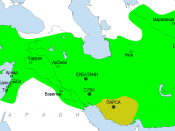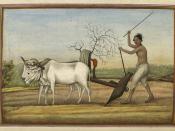History of the Persian Empire by A.T. Olmstead
When Cyrus "The Great," entered Babylon in 539 B.C. The Persian Empire began. Stretching from the Indus River to all the way to Egypt. This Reign of power is considered a model for the future empires because of their justice system, simplified religion, hierarchy, and roadway system. Unlike some of the pharaohs in Egypt, who collected any amount of tax, anytime they wanted to, the Persian rulers collected the taxes fairly.
There was no sudden increasing in tax amounts and no sky-high tax amounts. Even though the Persian kings had the same power as a Pharaoh, they did not abuse their power by being unfair in administrating justices. They were fair to everyone. Also, the Persians won the favor of the priests and the loyalty of the people by appointed the kings and officials from the countries they have conquered as governors, and let the people keep their own religions and laws.
This sounds familiar doesn't it; the Romans practiced the same ideas to expand their empire. The Persians only worshipped two gods, one good god, who symbolizes light, was Ahura Mazda; and the evil god, symbolizes darkness and death, was Ahriman.
This religion was developed by Zoroaster, a great prophet and religious reformer, in about 600 B.C. Zoroastrianism was a model because of its simpleness. Unlike other early civilizations that worshipped many gods (polytheism), the Persians saved time and money by concentrating on two gods. Another model from the Persians was the roadway system. Because of roads, the communication became stronger and faster; not only that, the trading process was better too. Because of the roadway system everyone can travel faster and safer, especially for the caravans. If Cyrus the great didn't travel to Babylonia and started the ever conquering Persian Empire, we probably would not have all these advantages and any fair justices if it were not for the Persian Empire
"...it is likely that Olmstead may have been overly sure of facts, this book is a pleasure to read and a mine of cultural food for thought ... I was chiefly interested in the religious and cultural aspects of the Persian period, rather than the military and political ones, and I have come away from this book considerably more enlightened ... Olmstead is both a vivid and readable writer, witty, detailed and fair-minded. His treatment of the Zoroastrian religion was eye-opening ... and the way he deals with Palestine and Egypt was also illuminating ... renditions of some ancient documents and inscriptions at a purely aesthetic ... there's still more to know, but this is a terrific overview." (Timothy Dougal.)
This book is where long and informative. It gets to the point to where you get an overview at the beginning of each chapter then there are more subchapters to explore further issues. The author does not put in any of his own comments or to his side it is all facts and when he gets into legends, Olmstead brings you into a world with descriptive language; which comes from natives of the land like historians and religious men. For those seeking knowledge of the ancient Persian Empire to the present day Palestinian problems.


